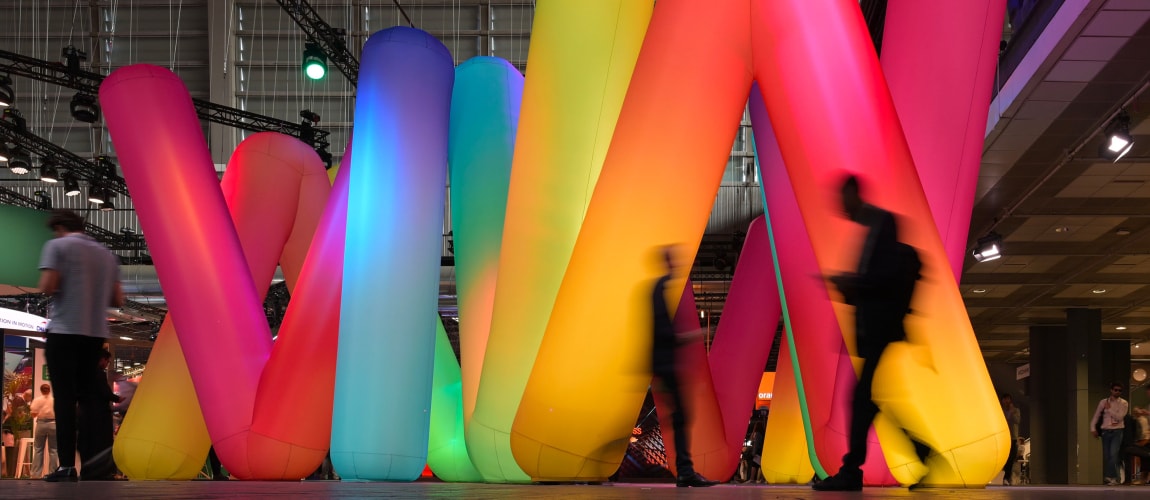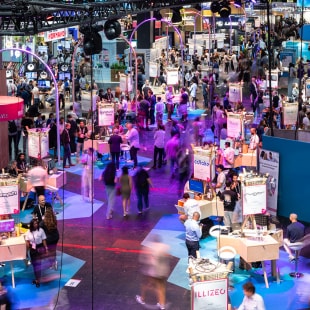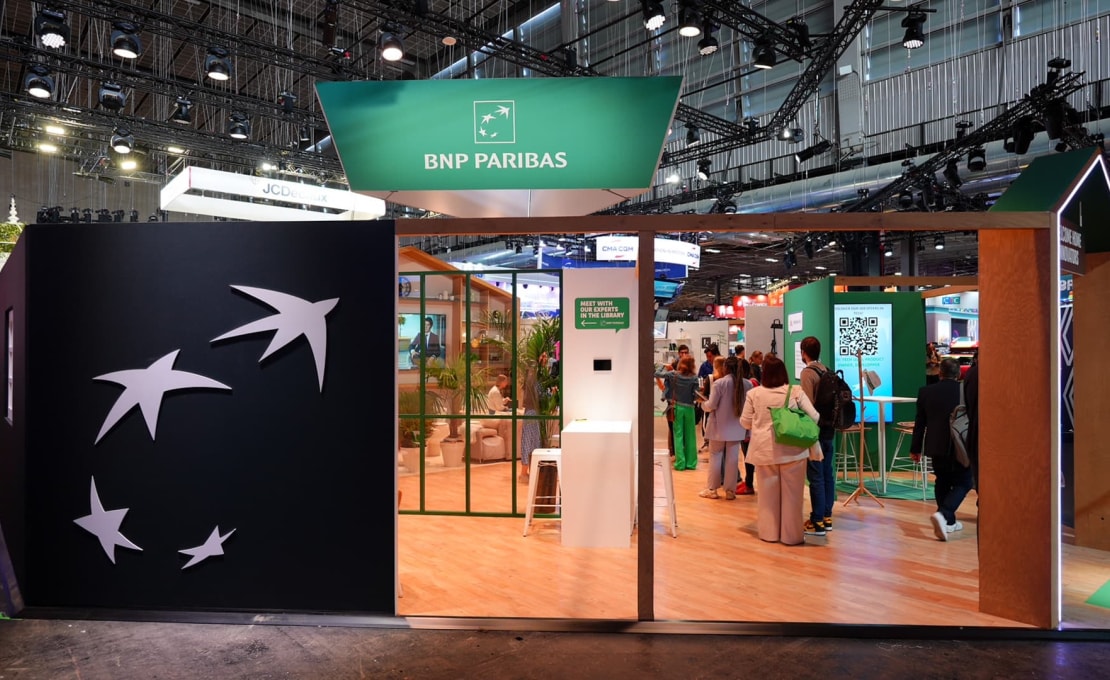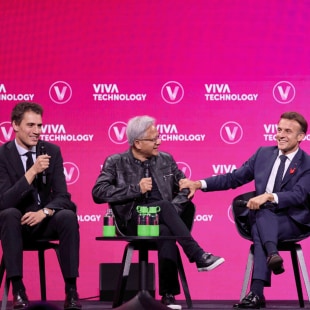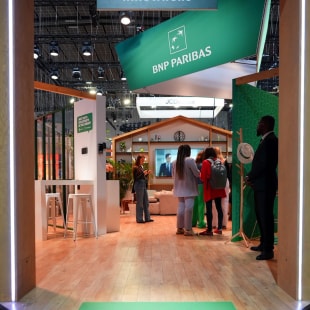It’s a real record-breaker. VivaTech 2025 welcomed 180,000 visitors, 14,000 startups and attendees from more than 170 countries – a 20% jump in attendance compared to last year. These numbers only reinforce its status as the world's premier tech summit and a must-attend event for anyone interested in innovation and where it's heading. So, what stood out this year? And what key messages did industry leaders share over four days? Here's what we saw.
Artificial Intelligence was the undisputed star of VIVA Technology 2025
Whether generative, agent-based or embodied in robots, artificial intelligence was everywhere this year. It dominated the event, with 40% of exhibitors presenting AI-powered solutions. The tone was set right from the entrance, which opened onto the AI Avenue hosted by Salesforce, alongside the AWS stand with its generative AI demonstrations.
Every sector is involved, from healthcare to finance. At the House of Innovations, BNP Paribas’ booth was designed like a stylish, high-tech home with different welcoming spaces (including a living room for conferences, a kitchen for networking and socializing and a garage for car charging). Here, a young startup is putting AI to valuable use: Zurich-based startup Unique, integrated within the Group, deploys specialized AI assistants for automating financial operations to ensure compliance while improving both speed and reliability.
VIVA Technology 2025: House of Innovations by BNP Paribas
Artificial Intelligence as a symbol of sovereignty?
More than in previous VivaTech events, AI was framed as a matter of sovereignty in response to growing geopolitical tensions. This was clear from the exceptional opening conference at the Dôme de Paris arena on the morning of June 11. The session brought together Jensen Huang, founder of NVIDIA, Arthur Mensch, CEO of Mistral AI, and French President Emmanuel Macron.
Together, they affirmed a shared commitment to building a “sovereign European AI,” based on a local value chain from chips and data all the way to models. This vision is taking shape with the launch of Mistral Compute, a European AI computing infrastructure led by Mistral AI and NVIDIA. The goal is to enable Europe regain control over its technology and data.
Other European companies including Scaleway, OVHcloud, Nextcloud and Ionos are also developing sovereign cloud services with the aim of offering credible alternatives to US hyperscalers.
Growing interest in Impact Tech
After sovereignty comes responsibility. AI and emerging technologies are increasingly working to protect the environment through purpose-driven startups. Sponsored by EDF, the Impact Bridge was a 1,500-square-meter space dedicated entirely to solutions benefiting society and the planet. It featured startups recognized for their meaningful contributions to Tech for Change.
For example, Japanese company Ocean Eyes uses AI to forecast ocean conditions from satellite data. At BNP Paribas’ House of Innovations, Kumulus Water, funded and supported by the Group, impressed visitors with a highly innovative process: creating clean drinking water from thin air!
Cybersecurity tops the agenda
The rise of AI comes with another major challenge: cybersecurity, and how companies must learn to face a new generation of cyber threats. This is a priority for a banking group of BNP Paribas’ scale. On the Purple Stage on Thursday, June 12, Olivier Nautet, CISO & Head of Cyber Security & Digital Fraud at BNP Paribas, gave a talk on how companies can navigate the new era of AI-powered cyber threats. He warned: “We are only at the beginning of AI. This is not merely an evolution in cybersecurity, but a real revolution” and added : "AI must be integrated into hybrid systems where humans retain a critical decision-making role."
Three questions with Olivier Nautet, CISO and Head of Cyber Security and Digital Fraud at BNP Paribas
- How is AI transforming the cyber threat landscape? Is this evolution or revolution?
We are only at the beginning of AI. This is not merely an evolution in cybersecurity, but a real revolution. Hackers already use AI to crack systems, create highly targeted attacks and craft flawless phishing emails in any language. AI also enables zero-day attacks that exploit unknown software vulnerabilities before defenders can react. The good news is AI also helps build stronger defenses.
- How do you manage the increasing speed and volume of data in cybersecurity?
- With the rise of deepfakes and misinformation, how can companies like BNP Paribas protect their reputation and maintain trust?
We cannot control everything, especially on the internet, but we need to be able to react quickly, prove that content is fake and show the truth. That is why we rely on scientific models and combine technology with human expertise. This requires continuous anticipation: we need monitoring systems, communication plans and authentication tools embedded in a company’s culture. The real danger is not the attack itself, but the inability to prove it is fake.
Focus on health with Med Tech and Health Tech
AI will help us live better and longer: that's what was promised by the Med Tech and Health Tech startups, which were well represented this year. French startup BodyO showcased Buddyo, a compact device measuring 30 cubic centimeters and weighing 6.5 kilos that serves as a “health companion” and personal medical analysis laboratory at home. It tracks about 20 health indicators including blood pressure, body temperature, heart rate, oxygen saturation and uric acid levels.
Another standout was Baracoda, highlighted by BNP Paribas, which unveiled an intelligent bathroom mirror. This mirror displays vital signs like blood oxygen levels, heart rate and stress levels. Most importantly, it can detect falls or abnormal movements and alert emergency services.
These two examples share the same idea: making AI a tool for preventive care, monitoring and safety in service of our wellbeing at any age.

